Sailing Competitors Rise to the Challenge of a Tough Annapolis to Newport Race
Seventy-three registrations, 62 on the starting line, and 29 finishers: such were the stats for the biennial 475-mile-long Annapolis to Newport Race, hosted by Annapolis Yacht Club (AYC) and running from two starts (June 2 and 3) into the next week. Competitors saw a wide range of conditions from a wind postponement for the first start, to big breeze at the mouth of the Bay. Racing sailors reported 10- to 12-foot seas as they turned north, doldrums along the way, and even thunderstorms with hail as they crossed the finish line.
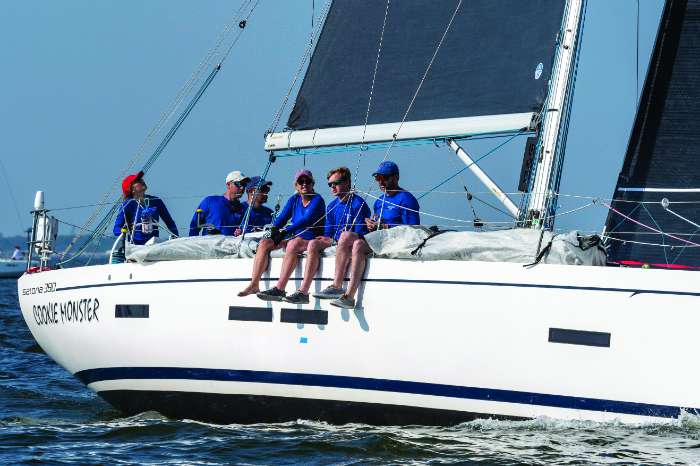
Stephen Hale and his team aboard the Salona 380 Cookie Monster placed first in ORC 4. Matt Alisch, Athena Arnold, Meredith Glacken, Connor Merryman, Julius Smith, and Katy Zimmerman rounded out the crew.
“We had such a great team, and I had so much confidence in them,” says Hale. “I knew the team could handle any conditions that the boat could tolerate. The months of practice really gave us the confidence in each other to push on when the conditions deteriorated. To quote one of our helmspeople, Katy Zimmerman, ‘Every sail went up and down clean, and we got sick. The team filled in until they recovered, and we sailed every four-hour shift like it was the finish.’”
After the team rounded Chesapeake Light, the second night was the hardest. Hale says, “We had difficulty getting our second reef in. By the time it was sorted, most of the crew and I were soaked. By midnight, we had four people seasick to some degree, which meant I and watch captain Matt Alisch had been on the helm for hours and just absolutely exhausted, trying to keep the boat pointed into the 25- to 30-knot winds and waves, and keep in touch with our competition.
“At some point I knew I was nearly tapped out. Conner Merryman stepped in on the helm, which kept us going until daylight. We were beat up and exhausted, but by daybreak Sunday, we could see we were still in the fight with the Navy boats and knew that if we kept pushing, we had a real shot at the podium. And no one gave up.”
When asked in retrospect if he’d have done anything differently, Hale responds, “We had a lot of trouble getting the satellite weather downloads to work; I wish I’d spent more time before the start troubleshooting this. After we left the Chesapeake, we weren’t able to get WX or Yellow-brick tracking until we approached Block Island. This limited our ability to take risks and separate from the fleet, because the GFS and Euro models that we had on the exit from the Bay were not in agreement.”
Hale’s top tip for teams considering doing an ocean race is: “Teamwork: Pick the team early and find a night on the Chesapeake where it’s blowing 20-plus-knots and go out with the entire team. Practice putting in the reefs and storm sails under realistic conditions and do some man-overboard drills in the dark. Stay out there until people are wet, cold, and uncomfortable, and don’t go back until you’re confident that everyone can handle 24 to 48 hours of that weather.”
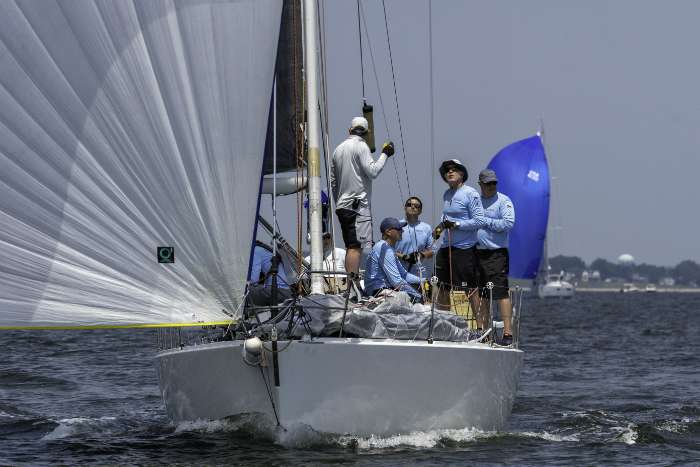
West River Sailing Club (WRSC) member Todd Berget and his crew aboard the J/120 Skadi placed first on ORC 3. Skadi’s crew included Chris Allen, Sam Carter, Andy Herbick, Robert Lancaster, Jeff LoSapio, Robert Marino, and Will Rottgering.
“It was a tough race for sure,” says Berget. “Once we got out in the ocean, we sailed conservatively with a double-reefed main and #3 headsail and tried hard to minimize the pounding. Our goal was to preserve the crew and boat as much as possible and still be in touch with the leaders in our fleet. That seemed to work but not without a lot of seasickness and one injury that left us a bit shorthanded. The waves were pretty big on Sunday to the point where we had green water coming back into the cockpit. Lots of water down below which drives me crazy! Overall, the conditions were bad, but not unmanageable.”
The worst part for the team was “pounding and seasickness.” The best part? “We had a really fun run for about the last 40-50 miles into Newport. We had kites up for all of it and were just pressing the boat as hard as we could, often sailing at 110-percent of polars. We knew we had to push hard to make the tide gate inside of Block, and we managed to nail it. It’s also amazing coming into Newport under spinnaker on a sunny afternoon.”
Berget notes a few things that worked for his team that may help aspiring ocean racers: “Don’t be afraid to reef. We carried a double reef when most J/120s don’t even have a second reef installed on the sail. It makes the boat easier to handle… Prioritize looking after the crew and boat over trying to press too hard. We were really surprised at how little we gave up by sailing pretty conservatively.
“Finally, don’t be afraid to get some coaching. We are mostly a bunch of beach cat racers and needed some help to make the transition to being good offshore sailors. Fortunately, we knew (Navy Varsity Offshore Team head coach) Jahn Tihansky well from racing his A-Cat at WRSC and hired him to help us out. That has probably made the biggest impact on our performance, safety, and confidence.”
Berget thanked his team, including those onshore. “We had an amazing shore crew that included Mary Ewen and my wife Leanne. My wife has been super supportive in the lead up to the race, taking care of our kids’ busy schedules and managing the house, affording me the time it takes to get prepared for an event like this. The Skadi team in general is amazing when it comes to pitching in to help with boatwork, practices, and all the other prep that these types of races entail (chef Jeff!).”
The Skadi team was awarded the Blue Water Bowl for overall performance, and navigator Sam Carter was awarded the City of Newport Trophy.
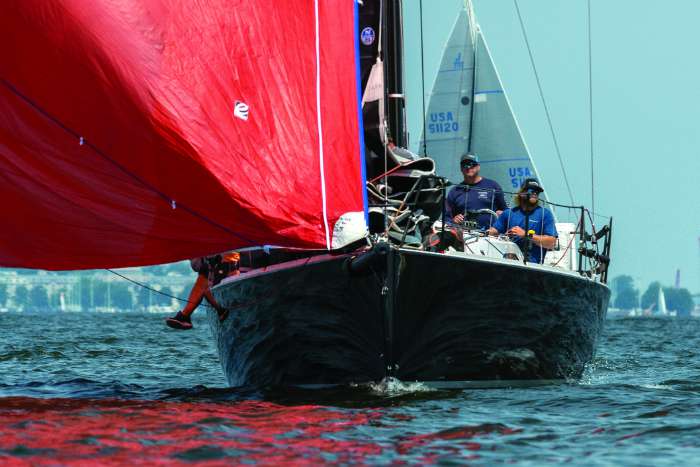
AYC member Ken Comerford, who placed first in the 12-boat ORC 2 class with his team on Dark Storm, says, “I was concerned with the original forecast that showed winds into the high 30s, and based on years of ocean racing I was concerned for the boat and crew. As it turned out the conditions were better than originally thought.”
Mike Coe, Kyle Comerford, Keenan Hilsinger, Paul Luisi, Jack McGuire, and Austin Powers made up the Dark Storm team. Kyle Comerford, the skipper’s son, had to do a bow pulpit repair underway, which was one of the team’s more exciting moments.
“We had a seal go bad, and the large Delrin washer came out. We had a lot of water in the boat and were very close to putting our electrical system under water… Kyle rigged up a tape gasket and some wedges for the pole and allowed us to carry on.”
As well as being honored as one of the Yacht Club Trophy teams for best performance from an individual yacht club (along with Ben Capuco’s Zuul and Richard Born’s Windborn), Comerford’s team earned the James Allsopp Memorial Seafarer Trophy for best combined performance in the 2023 A2N and 2022 Newport Bermuda Race.
Of his team’s performance, the skipper says, “We stayed focused on keeping the boat moving fast and tried to stay with our plan. We had a few challenging decisions, but good judgement helped us make the best decisions based on where we thought we needed to position the boat for getting to the new breeze first.”
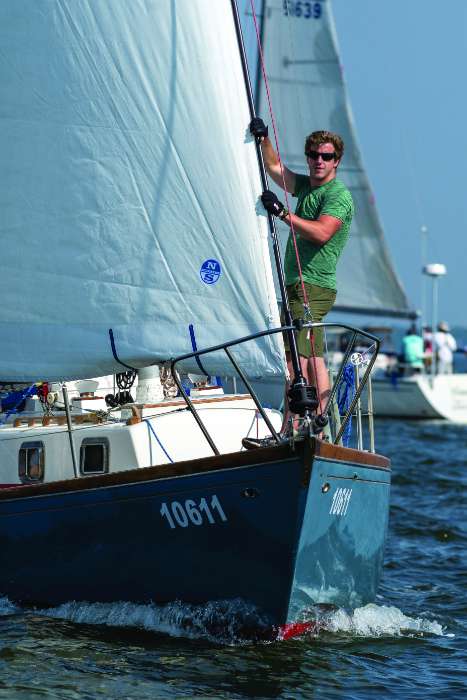
One of the best stories to come out of a rough A2N was that of Hattie Warwick-Smith of Lewes Yacht Club and her team aboard the Tartan 34C Iris. Joshua Getka, Elizabeth Hinkle, Eric Linder, and Patrick Ward crewed aboard.
Warwick-Smith’s crew was the last to finish this race (after five and a half days) and the only one to finish in the ORC Cruiser class—their first-place finish was announced at the awards ceremony the night before their Thursday arrival. The skipper was grateful that the AYC race committee got up early to greet her team at the finish line at 6:45 a.m. She was stunned and touched to have received the Gaither C. Scott Corinthian Spirit Trophy.
Among the memorable moments for the Iris team’s adventure, Warwick says, “At the bottom of the Bay, we paused to put up the Solent stay and storm jib and triple reef the main. At that time one of our crew’s AIS MOB devices activated by mistake, and we had a nearby ship and the U.S. Coast Guard calling us to make sure we were okay. At the same time family (members) texted, asking if we were okay, as the YB Tracker had us listed as retired. We responded, ‘Hell no, we’re racing!’ Not finishing the Annapolis to Bermuda Race last year was very tough on all of us, and we weren’t ready to make that decision again, unless we really, really had to.”
The skipper adds, “Getting out of the Bay the seas were large and getting larger the closer we got to Chesapeake Light, and I was so impressed with how well Iris was going given how challenging the conditions were. We were making way, had good steerage, and a fairly comfortable ride all things considered.”
Crew seasickness was the most challenging part of the race for this team. “Two crew were pretty incapacitated for a good part of the trip, leaving three of us to rotate and cover watches. The doldrums were also terribly crushing. It’s hard to get going in light air on a heavy displacement boat like mine… we assumed our fleet was way ahead of us.”
As for what her crew did well, Warwick-Smith says, “Really good sail trim and helming and a positive cheery attitude. We all like heavy weather sailing, so it was great to hear the new watch be excited to take over the helm!”
Warwick-Smith’s advice to new ocean racing teams would be to “Get good sails for all conditions, and don’t delay on sail changes. Had we had anything bigger than our storm jib going offshore things might have ended differently. Also, we at one point considered leaving the 155-percent genoa at home, but with the light wind later in the race we were so happy to have it.”
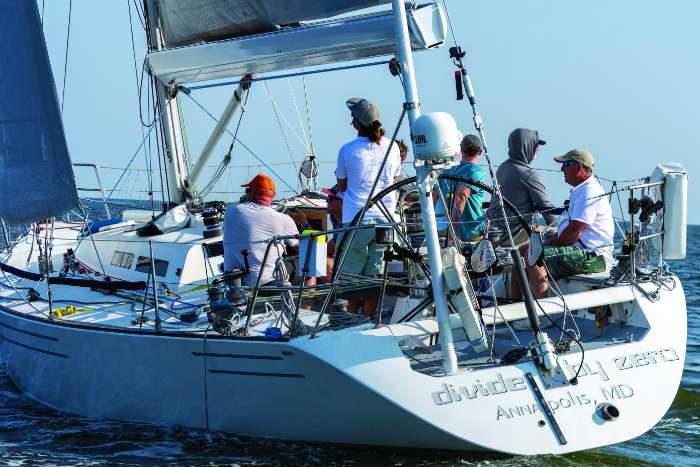
Among other memorable Chesapeake awardees was Eastport Yacht Club member John Lanigan on the Frers 45 Divide by Zero for earning line honors for Friday starters, the Chip Thayer Perpetual Trophy, and first place in ORC Racer-Cruiser.
As for other trophies, the Surflant Prize for Best Corrected Time ORC for a service academy boat went to 1/C Midshipman Phil Pacheo on the Navy 44 Defiance. The Gerber Cup for Best Corrected Time ORC for a Naval Academy Boat also went to Pacheo aboard Defiance. The Cary Arthur Memorial Trophy for the Navigator with the Best Corrected Time for a USNA boat went to Midshipman 2/C Nicholas Widick on Defiance.
Find more: annapolisnewportrace.com. Find photos: spinsheet.com/photos.




